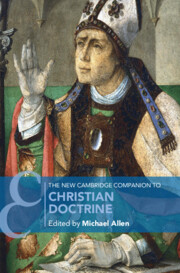Book contents
- The New Cambridge Companion to Christian Doctrine
- Cambridge Companions to Religion
- The New Cambridge Companion to Christian Doctrine
- Copyright page
- Contents
- Contributors
- Preface
- Part I Doctrines
- 1 The Triune God
- 2 Creation and Providence
- 3 Humanity
- 4 Israel
- 5 Christ
- 6 Atonement and Sin
- 7 Holy Spirit
- 8 Holy Scripture
- 9 Church and Sacraments
- 10 Eschatology
- Part II Movements
- Index
- Cambridge Companions to Religion (continued from page iii)
- References
4 - Israel
from Part I - Doctrines
Published online by Cambridge University Press: 03 November 2022
- The New Cambridge Companion to Christian Doctrine
- Cambridge Companions to Religion
- The New Cambridge Companion to Christian Doctrine
- Copyright page
- Contents
- Contributors
- Preface
- Part I Doctrines
- 1 The Triune God
- 2 Creation and Providence
- 3 Humanity
- 4 Israel
- 5 Christ
- 6 Atonement and Sin
- 7 Holy Spirit
- 8 Holy Scripture
- 9 Church and Sacraments
- 10 Eschatology
- Part II Movements
- Index
- Cambridge Companions to Religion (continued from page iii)
- References
Summary
Today, a Christian doctrine of Israel will be worked out under the shadow of Christian persecution of Jews – which prepared the way for the Holocaust – and also in the context of the passages in the New Testament that exhibit harsh polemic against Jews who did not accept Jesus as the Messiah.1 Traditionally, Christians supposed that the ongoing Jewish people who do not accept Jesus as the Messiah are in a condition of covenantal infidelity and covenantal curse. Christians assumed that the Jews’ covenants had been revoked so that they no longer are God’s people. Christian sermons and writings about the Jewish people, whether in the dreadful stereotypes and violent language employed by Martin Luther, or in Blessed John Duns Scotus’s approval of the forced baptism of Jews, or in St. John Chrysostom’s poisonous rhetorical invective against the Jewish people of his day, had an impact over the centuries in pogroms, expulsions, and abuse of all kinds.
- Type
- Chapter
- Information
- The New Cambridge Companion to Christian Doctrine , pp. 53 - 69Publisher: Cambridge University PressPrint publication year: 2022

